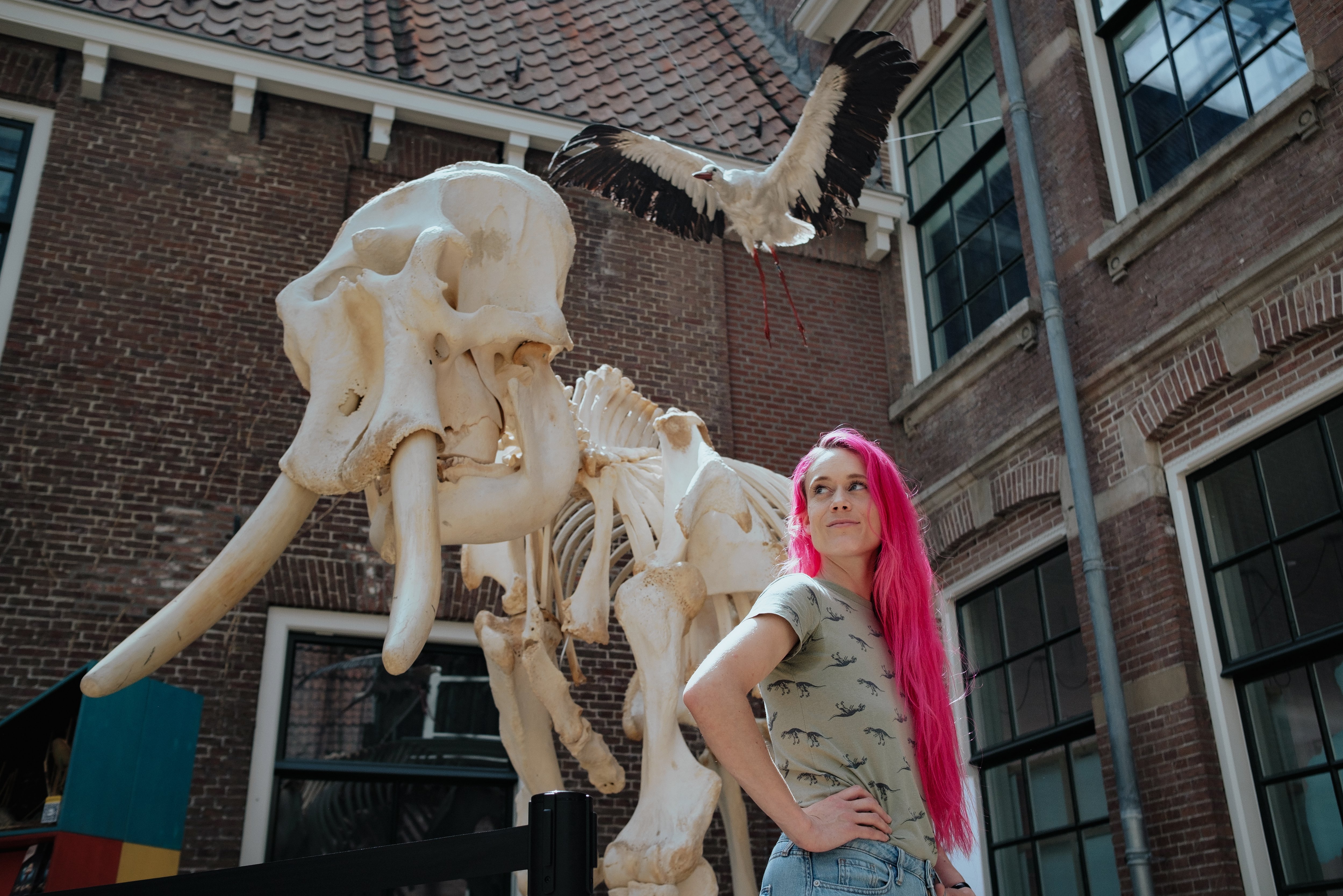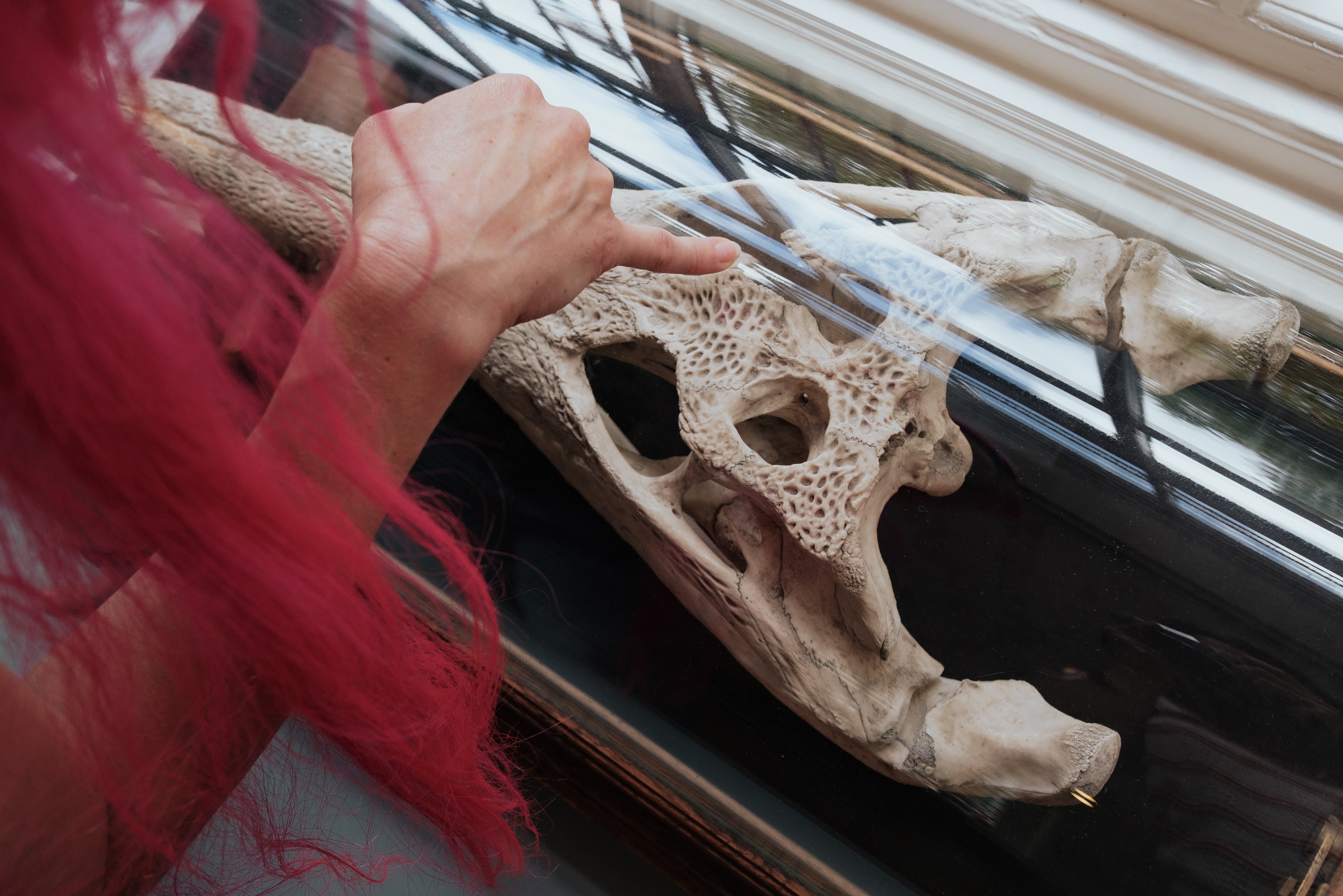"I'm worried about the sweet, friendly Americans"
%2Fs3%2Fstatic.nrc.nl%2Fwp-content%2Fuploads%2F2025%2F07%2F30131509%2Fweb-2607BUI_MelanieDuring_HP.jpg&w=1920&q=100)
When did she first meet an American? Paleontologist Melanie During (born 1989) doesn't have to think long: it was digital, during her gaming days. "I was eighteen and in high school in Alkmaar," she says in one of the spacious rooms of the Natural History Museum of Friesland, where her boyfriend is a curator. "I started dating Marco, a high school student who was addicted to gaming. I became addicted too, and met a lot of American gamers."
At the time, she noticed that Americans are "very sweet, very friendly," but also "insecure and vulnerable." Because healthcare in the United States is expensive and many Americans are uninsured, gamers started crowdfunding campaigns one after another. They were often desperate, says During, because they couldn't afford an operation or were in financial debt after a difficult delivery.
During quit gaming (and Marco) to focus on what has fascinated her since childhood: the history of the Earth. We can take the land our house stands on for granted, she says, but it's not so self-evident. "All continents have been somewhere else at some point, and that has major consequences for the climate and the organisms on those continents."
During—dubbed "the rock star of paleontology" because of her pink hair—went on to study geosciences at the University of Amsterdam after high school. She quickly realized that America is the place to be for geoscientists, if only for the numerous dinosaur remains found there. For her doctoral research at Uppsala University, she searched for the last dinosaurs in North Dakota, USA.
Volcanic eruptionDuring has great admiration for certain American authors of the geology books she read during her studies. One such author is geologist Walter Alvarez, son of Nobel Prize winner Luis Alvarez. He became famous for discovering a clay layer rich in the rare element iridium, which is common in meteorites. His conclusion: the extinction of dinosaurs was the result of a meteorite impact some 65 million years ago, which ejected the impact material into the atmosphere.
In 2012, During visited the US for the first time. She was 23 and had written an essay for an elective on the history of the Big Bang . In it, she examined the societal consequences of a volcanic eruption in Iceland in 1783. "A gigantic eruption," she says. "Europe was plunged into total darkness for two years; the consequences were far greater than the 2011 volcanic eruption in Iceland, which paralyzed air traffic in Europe. Because the harvest could no longer be produced, famine broke out. That ultimately led to the French Revolution."
Her instructor found the essay so original that, without her knowledge, he submitted it to the organizers of a conference on big history in Michigan. During was promptly invited to give a lecture.


One problem: she had to finance the trip to Michigan herself. At the time, she was living on disability benefits (Wajong) because she suffered from scoliosis and hypermobility as a child. "I had to borrow money from several people."
To save money, she planned to fly to Toronto and stay overnight with the fiancée of her father's cousin (whom she'd never met). From there, she'd take a bus to the Dutch enclave of Grand Rapids, Michigan, where she'd found affordable lodging with an artist through Airbnb. After the conference, she'd take the bus back to Toronto to stay overnight before the return trip.
Things turned out differently. She couldn't find a new home with her distant relatives in Toronto after the conference, and the artist in Grand Rapids turned out to live miles from the bus station. These obstacles, it turned out, were surmountable, thanks to the kindness of the Americans she had already experienced as a gamer.
At the bus station, an American spontaneously offered her a ride to her place of residence. "He told me his daughter was traveling through Europe alone. She was the same age as me, and he hoped she, too, would get a ride if she found herself in my situation."
And when it turned out she couldn't stay with her family in Toronto, an IT professional she'd met at the conference offered to take a road trip together and get her back to Toronto in time for her return flight. They visited, among other places, the Field Museum in Chicago, home to the world's largest and most complete T. rex skeleton. The IT professional, Heathe, helped her out of generosity, says During. "We're still friends."
At the conference, she also met Walter Alvarez, whom she admired. After her presentation, Alvarez approached her and thanked her for demonstrating the relevance of geology so clearly. A gift few geologists possess, he said.
:format(webp)/s3/static.nrc.nl/wp-content/uploads/2025/07/17164910/web-0507ZAT-Werken-in-de-VS-Icoon-Transparant-Chris-Bosch.png)
This summer, NRC is interviewing Dutch people with strong personal ties to the US. Will their feelings and ideas about the country change now that it's been so transformed under Trump?
Read all episodes here
After that first encounter with the US, During visited the country several more times. In 2015, for example, she volunteered as a student at the Naturalis natural history museum in Leiden, and participated with a group of staff in the excavation of a mass grave of five dinosaurs in Wyoming. "Wyoming is much more conservative than Michigan. I already had pink hair back then, and I noticed I had to smile extra friendly to avoid nasty remarks."
But Americans were also impressed by her, During noticed. Like the rancher who made his land available to Naturalis (for a fee). He asked if she had ever shot a pistol and was astonished when During outdid all her male colleagues when shooting at a straw target . "'I have many more weapons,' he said. 'Would you like to try those out?'"
Driving from the airport through North Dakota in 2017, on her way to a dig site for her master's thesis on fossilized freshwater fish, she noticed how the atmosphere in the country had changed since Donald Trump's 2016 election victory. "I drove through small towns, filled with Trump flags. An unhealthy form of personality cult. I felt a deep sense that I should keep my opinions to myself."
:format(webp)/s3/static.nrc.nl/wp-content/uploads/2025/07/30130414/data135350745-9ac3ef.jpg)
In recent years, Americans have become "more easily triggered," During notes. They're "entering discussions headfirst," especially those in underprivileged areas where poverty is widespread. "They feel they can say and do whatever they want. They no longer have to prove their point."
In 2023, During was "chased away" in North Dakota by a group of landowners. She and colleagues were doing fieldwork on public land; they had parked their car in a spot where the landowners were about to start mowing. "Instead of engaging us in conversation, they cursed us, pacing back and forth furiously. Even though they didn't appear to be carrying weapons, it felt threatening. We left immediately."
It didn't stop During from revisiting the spot almost a year later. She booked a different hotel, covered her pink hair to be less conspicuous, and checked with the Bureau of Land Management beforehand to find the best place to park. "Not far from that spot, I tripped over a large dinosaur."
Laptop confiscatedThe plan is to return in mid-September for further research on that dinosaur. She already has a ticket and the required electronic travel authorization (ESTA). But unlike all her previous visits to the US, she's worried she might not be allowed across the border. "I've read so many times on science forums that colleagues were put back on a plane. Because they had privately criticized Trump. Because they had written something objectionable on social media. Sometimes a phone or laptop is confiscated. Occasionally, someone ends up in jail for a short time."
She hears from friends and colleagues in paleontology and geology that research grants are being withdrawn. These grants are being withdrawn from projects that are supposed to be of general interest, because they involve raw materials for batteries, solar cells, and heat pumps. "Earth scientists are often dismissed as woke climate idiots. People don't realize that they're also searching for raw materials for products that no one can live without, as long as there are no sustainable alternatives."
She doesn't rule out the possibility that the US government is "keeping an eye on her" and has thoroughly reviewed her social media for any critical statements. She doesn't yet know whether she'll bring her laptop. "I'd hate to have to hand it over because they want to search everything." But there's one thing she refuses to change: her hair color. "That would be self-denial."
And does she still encounter that warmth she fell in love with as a teenager in America? "Oh yes, it's still there," says During. "I experience it in shops, restaurants, and at gas stations. People are always up for a chat, curious about strangers. But I do worry about those sweet, friendly people. To what extent is their warmth threatened?"
Anyone who has converted to Trump will struggle to remain warm-hearted, thinks During. Helping others isn't seen as a virtue in the current political climate. Or, as Trump's former right-hand man, Elon Musk, put it: the fundamental weakness of Western civilization is empathy. "When I read that, I had to swallow hard."
:format(webp)/s3/static.nrc.nl/wp-content/uploads/2025/07/30131507/web-2607BUI_MelanieDuring_extra2.jpg)
nrc.nl



%2Fhttps%3A%2F%2Fcontent.production.cdn.art19.com%2Fimages%2F5f%2Fa4%2Ff8%2F7c%2F5fa4f87c-8895-47ef-9dfa-db4e7c6c8c1a%2Ff45c7b3a56e35bfbdf3755162dee5e3d60cd8666da30d430ced1b22b6280593e6c63be868883d6b1dc3c920bac181d9f53b7af96d3406d5a5af380f228523323.jpeg&w=3840&q=100)

%2Fs3%2Fstatic.nrc.nl%2Fimages%2Fgn4%2Fstripped%2Fdata135678813-c86ea5.jpg&w=3840&q=100)